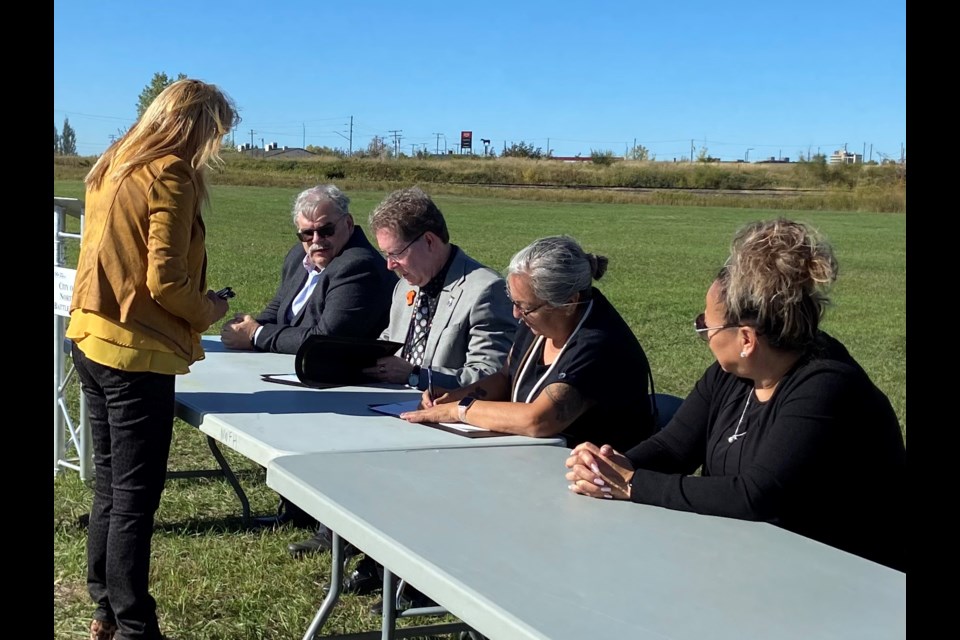NORTH BATTLEFORD — The City of North Battleford and Sweetgrass First Nation signed an agreement to convert a portion of the city into urban reserve land last Friday afternoon, after working together for more than a decade.
This will be the third urban reserve in the Battlefords.
“I'll be here for 14 years if I tell you the whole story,” said Lorie Whitecalf, the chief of Sweetgrass F.N., at the long-awaited Urban Reserve Services Agreement signing ceremony in front of all band members present.
The land where the ceremony was held, located at the corner of Railway Avenue and the Highway 16 Bypass in North Battleford, was acquired by the late Sweetgrass Chief Wayne Standinghorn in 2010, followed by extensive environmental clean-up for years, according to the City media release.
Neil Sasakamoose, chief executive officer (CEO) of the Battlefords Agency Tribal Council (BATC), said the key to success was “being stubborn.”
Sasakamoose said the idea to purchase the land came about when he drove past the now-closed Shell gas station in North Battleford, which was set to change hands, while with Wayne Standinghorn.
“You have to let these First Nations develop, and you just have to support them. They will build clean products here. They will build and promote your regions. They will bring people here.
“The amount of market that First Nations have in these towns is underestimated,” he said.
Sasakamoose stressed that the economic participation of the First Nations businesses sustains the city and the town’s development.“It's in every town we go there. We rent entire cities out, and people forget that really fast. But the hotels remember, the restaurants remember.”
Since the Treaty Land Development Agreement was signed with several Indian bands in 1992, Sweetgrass received $6,638,656.96 to purchase 23,914.02 acres of land. To date, Sweetgrass First Nation has acquired 17,699 acres of land — 95 per cent of which is “cultivated prime land,” according to Garry Albert, Treaty Land Entitlement trustee with Sweetgrass FN.
A small portion of pastureland was acquired from retiring private farmers, Albert said, but acquiring Prairie Farm Rehabilitation Administration (PFRA) pastures from the province has been challenging because patrons are hesitant to sell.
The neighbouring Red Pheasant Cree Nation celebrated a new commercial retail development on their urban reserve in North Battleford just a year ago.
The chief of Red Pheasant Cree Nation and Tribal Chief representative for BATC, Cody Benson was present at the ceremony to provide moral support.
“We've been fighting the fight too, and we're starting to get our stuff off the ground and moving. We’re always going to be here to help Sweetgrass thrive.
“Because if they thrive, we thrive. If North Battleford thrives, we all thrive,” he said.
As companies begin to emphasize their Indigenous ownership and building economic independence on urban reserves, the City looks forward to working with dynamic First Nations communities.
“We have now a number of urban reserves in the City of North Battleford, and I'd like to think that they're all thriving, and I expect that Sweetgrass will as well,” City Mayor David Gillan said.
Gillan said economic reconciliation is a big part of relationship-building and attracting talents to the community.“As Senator Spyglass always says, yes, ‘we have to remember the past,’ but we live in the future and the present, not in the past,” he said.
Throughout the four-year tenure, Gillan said the council has been working on the shared vision of inclusivity and that the next leader understands that.
“Everybody is watching. Everybody analyzes our community. They can invest in many places (in the city).”
Over the 14 years carrying on Standinghorn’s vision, chief Whitecalf said she has worked with three different mayors and three different city managers and multiple lawyers, “…and (we) never gave up.”
“We are big players here (in the community), our population is strong,” Whitecalf added.
Whitecalf said last year has seen a record number of Gr. 12 graduates of 29.
“It will be a blooming place,” she said.
The agreement paper is now being submitted to the federal crown for final approval.
“There's a table here, there's a teepee there, there's an eagle up there, and there's people here and watch this place prosper, just like all these other First Nations,” Sasakamoose concluded.
Back in the audience seat sits Senator Jenny Spyglass with her food, who, at 83, still works as an elder at BATC, and speaks in a quiet voice.
“I was admiring that yellow vehicle over there. (It) reminds me of the old, old-age battle.”
“That eagle (soared the sky) must be Wayne Standinghorn that came and said: ‘Thank you for picking up the work.’”




